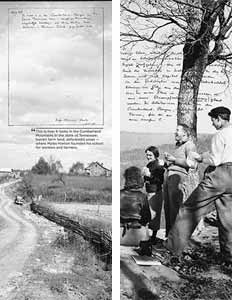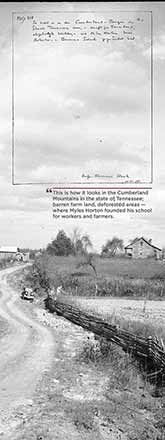Reflecting Changes*
SCHWARZENBACH: “The vision of a better life, the long-cherished
American dream is losing its shine, the further South the roads
lead you. The land is sun-baked from the summer’s heat, and
rusting under the drizzling rain of seven decades of poverty. The
fall foliage on the hills brightens the wide Tennessee River valley
through its reddish colors, and the red earth wells forth out of the
deep crevasses that wind and water have carved into the slopes.
The woods that formerly protected the land have disappeared.
Black tree stumps and white rocks are scattered over the poor
and barren fields that had only yielded small amounts of corn,
potatoes, and sugar cane.”
SCHWARZENBACH: “This is how it looks in the
Cumberland Mountains in the state of Tennessee;
barren farm land, deforested areas — where Myles
Horton founded his school for workers and farmers.
Low wages, an unemployed rural proletariat, lack
of (union) organization for the workers, and a
backward welfare legislation. This is what the South
offers to industry today. During the last couple of
years the North invested much capital in the South;
smokestacks are shooting up like mushrooms. A
new hosiery-mill was erected at a river in the state
of Tennessee.  The female workers come from the Cumberland Mountains.
They are the daughters of destitute farmers for whom weekly wages of
5–8 dollars mean an awful lot of money!”
The female workers come from the Cumberland Mountains.
They are the daughters of destitute farmers for whom weekly wages of
5–8 dollars mean an awful lot of money!”
“The officials and organizers of the Committee for Industrial Organization
(CIO) are aware of the fact that the ‘move of the industry to the South’
marks a new phase of exploitation, oppression, and violence. They,
however, believe that the concentration of workers in the industrial
centers will create a chance to organize unions, and also, that organizing
oneself in unions is the only means to fight the exploitation of ‘cheap
labor’ that is happening in the Southern states today.”
*NOTE: Panels Nineteen and Twenty are meant to be viewed together, as an example of the similar impressions had by Schwarzenbach, McCarthy, and Buddy and The Huddle.
Reflecting Changes*
 SCHWARZENBACH: “The vision of a better life, the long-cherished
American dream is losing its shine, the further South the roads
lead you. The land is sun-baked from the summer’s heat, and
rusting under the drizzling rain of seven decades of poverty. The
fall foliage on the hills brightens the wide Tennessee River valley
through its reddish colors, and the red earth wells forth out of the
deep crevasses that wind and water have carved into the slopes.
The woods that formerly protected the land have disappeared.
Black tree stumps and white rocks are scattered over the poor
and barren fields that had only yielded small amounts of corn,
potatoes, and sugar cane.”
SCHWARZENBACH: “The vision of a better life, the long-cherished
American dream is losing its shine, the further South the roads
lead you. The land is sun-baked from the summer’s heat, and
rusting under the drizzling rain of seven decades of poverty. The
fall foliage on the hills brightens the wide Tennessee River valley
through its reddish colors, and the red earth wells forth out of the
deep crevasses that wind and water have carved into the slopes.
The woods that formerly protected the land have disappeared.
Black tree stumps and white rocks are scattered over the poor
and barren fields that had only yielded small amounts of corn,
potatoes, and sugar cane.”
SCHWARZENBACH: “This is how it looks in the
Cumberland Mountains in the state of Tennessee;
barren farm land, deforested areas — where Myles
Horton founded his school for workers and farmers.
Low wages, an unemployed rural proletariat, lack
of (union) organization for the workers, and a
backward welfare legislation. This is what the South
offers to industry today. During the last couple of
years the North invested much capital in the South;
smokestacks are shooting up like mushrooms. A
new hosiery-mill was erected at a river in the state
of Tennessee. The female workers come from the Cumberland Mountains.
They are the daughters of destitute farmers for whom weekly wages of
5–8 dollars mean an awful lot of money!”
“The officials and organizers of the Committee for Industrial Organization
(CIO) are aware of the fact that the ‘move of the industry to the South’
marks a new phase of exploitation, oppression, and violence. They,
however, believe that the concentration of workers in the industrial
centers will create a chance to organize unions, and also, that organizing
oneself in unions is the only means to fight the exploitation of ‘cheap
labor’ that is happening in the Southern states today.”
*NOTE: Panels Nineteen and Twenty are meant to be viewed together, as an example of the similar impressions had by Schwarzenbach, McCarthy, and Buddy and The Huddle.


...the journey seems to me less an adventure and a foray into unusual realms than a concentrated likeness of our existence: residents of a city, citizens of country, beholden to a class or a social circle...
— Annemarie Schwarzenbach —